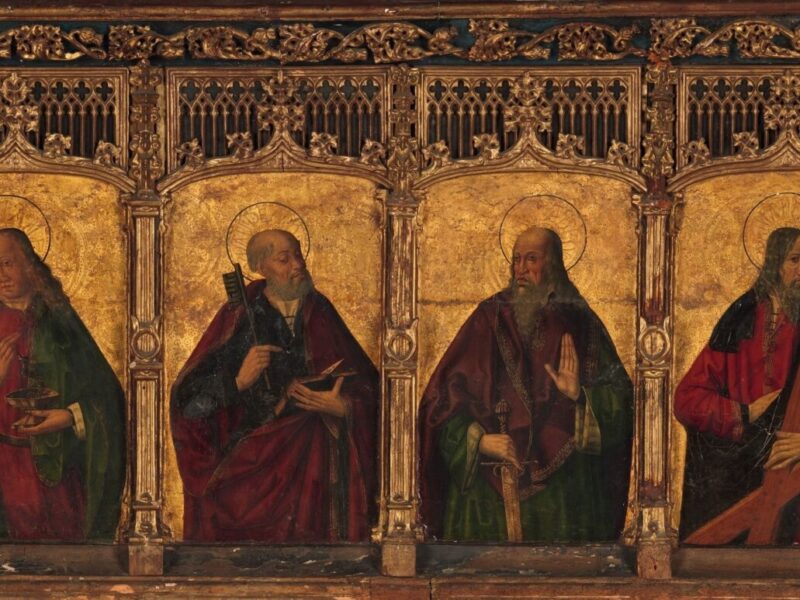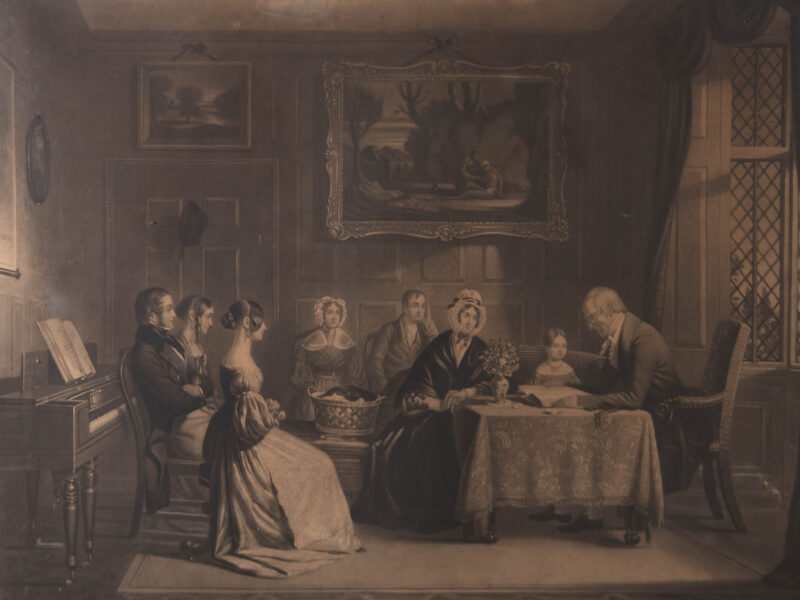Therefore confess your sins to one another, and pray for one another, that you may be healed.
—James 5:16
A key part of growing in spiritual stamina, drawing in closer union with God, and recovering from sin is spiritual discipline (askesis). For Christians, the “Big Three” are prayer, fasting, and almsgiving (see Matt. 6:1–21). But spiritual disciplines are not limited to these. Daily Bible reading, tithing, or memorizing Psalms are other disciplines. Spiritual disciplines are not dogmatic requirements. Rather, they exist for the benefit of the Christian, and how or what a Christian practices—his personal “rule”—is a matter of discernment, to be done in proportion to his capacity, according to his needs, and alongside spiritual counselors. Spiritual disciplines help the Christian make his conversion to Christ total, drawing the whole of existence into the life of prayer, which in turn makes him “fit” (i.e., “ready for use”; see 1 Cor. 9) for the commissions he receives through the Church.
Lay confession is another spiritual discipline. Despite its pedigree in Scripture and later tradition, it is today perhaps the most neglected. In confession, we do a difficult thing: we speak the truth about ourselves, perhaps to a stranger—or even harder, a friend. But as James identifies above, the promise of confession is healing.
An Ancient Example of Lay Confession
In the mid-fourth century, at the height of the monastic movement in Egypt, Macarius the Great lived as a solitary monk (anchorite) in the great desert. Nearby, a group of monks lived together communally. One day, Macarius while sitting on the roadside saw Satan pass by. He appeared like a man and wore a cotton garment full of holes. On each hole hung a small flask. Macarius asked Satan where he was going. The Tempter explained he was going to pay a visit to Macarius’s neighbors to remind them of the good things from their old sinful lives. Each flask contained the taste of a memory of a worldly pleasure. “If a brother does not like one sort,” explained the Devil, “I offer him another, and if he does not like the second any better, I offer him a third; and of all these varieties he will like one at least.” When Satan returned, Macarius greeted him pleasantly: “Good health to you.”
Satan replied, “How can I be in good health? They all opposed me, and no one received me.”
“Ah, you did not find any friends down there?” asked Macarius, sympathetically.
“Yes, I have one monk who is a friend down there. He at least obeys me and when he sees me he changes like the wind.”
Macarius asked the name of this monk. “Theopemptus.” Satan gone, Macarius rose and went to pay the brother a visit. Macarius was a famous spiritual father (abba) at this time, so Theopemptus was delighted to receive such a guest. When the two were alone in his cell, Macarius asked, “How are you getting on?” Theopemptus replied all was going well.
“Do not your thoughts war against you?”
“Up to now, it is all right.”
Macarius changed his tactic. “See how many years I have lived as an ascetic, and am praised by all, and though I am old, the spirit of fornication troubles me.”
Theopemptus said, “Believe me, abba, it is the same with me.”
Macarius proceeded to confess other thoughts that still warred against him. Each confession was like a stone placed for another’s stepping, and so Macarius brought Theopemptus to admit the same things about himself. In this way, the two gave each other a full confession. Afterwards, Macarius inquired after Theopemptus’s “rule”—his discipline of fasting and praying—and gave counsel on how to more effectively combat sinful thoughts, emphasizing meditation “on the Gospels and the other Scripture.” Then he rose and departed. When Macarius again sat on the roadside and saw Satan returning from another visit with the monastic community, he asked, “How are the brothers?” Satan replied, “They are all obdurate, and the worst is the one friend I had who used to obey me. I do not know what has changed him, but not only does he not obey me any more, but has become the most obdurate of them all. So I have promised myself not to go down there again, at least not for a long time from now.” When Satan had gone, the abba left the roadside and returned to his cell to pray.[1]
This story is an example from the Christian tradition of lay confession.[2]
Lay Confession
Lay confession is confession between laypeople. There is no priest, and therefore no sacrament of absolution. If absolution is seen as the primary incentive for sacramental confession, then the primary incentive for lay confession is mutual encouragement, fellowship, and edification. If the “effect” of sacramental confession is being declared forgiven inside a booth, then the (eventual and hoped-for) “effect” of lay confession, as depicted in the story above, is victory over Satan in the moment of temptation, perhaps long after the fact. These two modes of confession need not compete. This writer encourages this reader to do both. Each is a gift of the Church and a weapon in your arsenal. And like weapons, each differs in its proper handling and effects.
Confession as the Church
It is imperative we recognize this healing of which James speaks is not of individuals, but of the Church, and individuals insofar as they are the Church and members of that holistic Body. When we come together to confess, we operate as the Church (Matt. 18:19–20). In my experience, this communal aspect is the power of confession. By facing another, we face our sins in a direct way that is not typified by solitary confession in prayer (or openly in public). And in the other person’s attention and care, we experience the forgiving character of God.
To be clear, confession is not identical with apologizing to someone who has been wronged, for that would be reconciliation required of Christians rather than a spiritual discipline. The practice of this discipline amounts to expressing one’s confession to an unoffended third party.
Confession builds up the Church and reconciles her members, so it is paramount that you confess with someone who is baptized, spiritually mature, dedicated to your spiritual growth, and of the same sex. Do not select your spouse or child as your co-confessor. It is usually best to select someone who is not a family member, though siblings or cousins might suit. If you are having difficulty finding a suitable confessor, ask your pastor, priest, or spiritual director to recommend someone.
Lay confession, unlike sacramental confession, is a two-way street. So, be prepared to hear as well as be heard. Confession is an occasion for the members of the Church to bear each other’s burdens. You should not expect more patience, understanding, confidentiality, and brotherly care from your confessor than you can offer. It is inadvisable to have more than two in a session, particularly when you are just starting out, though confessing to a larger group has its merits.
These sessions should be regular, like medical check-ups. Begin by meeting monthly or only a few times a year, perhaps seasonally. In time, consider meeting more frequently.
The Ascetic Foundation
I do not recommend confession if you are not regularly practicing the Big Three. This is because confession requires a level of discernment under the guidance of the Holy Spirit. The mind begins to learn this discernment by submitting to the Holy Spirit in prayer, fasting, and almsgiving.
Lay confession is more an extension of the Big Three than a fourth thing. Anticipate your next confession in your normal practices of prayer, fasting, and almsgiving. My advice is to write down what you plan to confess. Try to do this at least a day in advance, but earlier is preferable. When first beginning, list no more than two or three sins, but be precise. Do not fail to name the sin (e.g., lust, anger, pride, etc.—naming is surprisingly easy to avoid, but it keeps us honest!), but do more than name. Tell a story: prayerfully trace its causes (e.g., resentment towards your wife? Lack of sleep?), its effects, who was affected, and what your life would look like if this sin was given freer reign. These reflections are not intended to compound your guilt: this can lead to a spirit of confusion. Rather, they cultivate contempt for sin by exposing its true character: this is the basis of a penitential spirit which cries, “Lord, have mercy!” (Luke 18:13–14). Without telling the story, we risk being blind to the body of sin in our members and end up merely listing off a record of discrete sinful acts.[3]
Storytelling is an automatic feature of lay confession. In lay confession, the two (or more) confessors may ask questions, share similar experiences, and offer what worked or didn’t work for them. Together, you work out your salvation with fear and trembling by giving advice and encouragement drawn from your attempts to follow Christ (Phil. 2:12).
Finally, in your regular spiritual discipline, remember your co-confessor(s). As his co-confessor, you are personally invested in his spiritual growth. Pray and fast for him as often as you do for yourself. Lay confession integrates the Church body by involving each member in the private spiritual life of the other. (James did not follow the exhortation to confess with “and pray for one another” by accident.) This is another reason the Big Three should be normal practice prior to lay confession, and why baptism is the prerequisite, the sine qua non, of confession. Confession renews the baptismal bond between members of Christ’s mystical Body.
Prayer should be a feature of each meeting. It is best to begin and end with prayer, but if you are short on time, then at least do the latter. After confession, pray God would forgive what each has heard the other confess. My practice is to keep these extemporaneous, but if you are in need of direction, then open with the prayer of general confession found in the daily offices of the BCP 2019 (without the words of absolution), and to close your time with prayer no. 79, “For Mercy” (p. 669).
What to Confess
When deciding what to confess, I follow the self-evaluation practice recommended by Antony the Great, a third-century monk.[4] He begins with the “powers” of the body, seven in all: eyes, ears, tongue, hands, belly, groin, and feet. (Notice he proceeds from the highest to the lowest.) Let’s look at some examples.
The “eyes” sin not only in a literal way by, say, following after a woman (Matt. 5:28–29) or “winking” (Prov. 10:10), but also by forming uncharitable assumptions about those whom we have never seen or are seeing for the first time. Additionally, I commit a sin of the eyes by getting on Twitter when I do so to satisfy a desire to see worldly praise and “likes.”
The “ears” sin by taking pleasure in gossip, lies, ill-speaking, and so forth. Antony warns that the ears rejoice to hear about “the falls and humiliations of men,” but should be trained to rejoice “about good things, and about the way every man stands firm and about the mercy shown to the whole creation” (cf. Phil. 4:8).
From these examples, you can infer what would be said concerning the other powers.
Our spiritual disciplines express certain spiritual realities. Antony’s schema affirms at least three. First, the body and soul are integrated partners in salvation: what one does hurts or helps the other.
Second, every “power” (or faculty) of the human person is touched by sin. Each must be healed, thus each can be a subject for confession, though in practice you will tend to emphasize one power over another, since sins collect around your weak areas like flies. Even if you have time to confess the sins of only one power, this is still viable because the powers are integrated. Antony teaches that just as each power has the capacity to drag the entire body with it down the path of death (cf. Matt. 5:30), the reverse is also true: Each power, when exercised in repentance, has the capacity to draw the entire body up to greater virtue.
Third, for each sin a power can commit, there is a corresponding good. Naming and committing to this good is as necessary for complete healing of that power as naming and renouncing its evil. Just as the belly sins “in its eating and drinking,” so it learns to obey “in its eating and drinking.” Antony thus understands sin as a mis-use of the body and the soul against God’s intended purpose. If we are not pursuing the good, actively committing our powers to their proper use, then sin becomes inevitable. (For if we are not doing good, what are we doing?) According to Antony’s schema, most sins are a result of negligence: at their root is, summarily, the failure to love.
Conclusion
Healing from sin is a process, not an event. You should not expect total healing from confession alone. The confessional practice is likely the next step in your sanctification, but others will follow, and you will not emerge from the confessional totally healed and alive in the Spirit. Think of the confessional as a surgical room. It cuts open and reveals and scalds the diseased inner parts (and very unlike a surgical room, you cooperate actively with the Surgeon in this process), but the sign of healing—of a “power” alive in the Spirit—is abundance in good works and victory over temptation. This takes place outside the confessional, yet this is the healing toward which confession works.
Abounding in good works is a foretaste of future resurrected glory: “And I think that when the whole body is purified,” says Antony, “and has received the fullness of the Spirit, it has received some portion of that spiritual body which it is to assume in the resurrection of the just.” Confession thus has an end beyond itself. Confession is less about clearing a ledger and more about freeing the self to obey and follow Christ, to whom be praise and dominion for ever and ever. Amen.
Notes
- This story is adapted from the Apophthegmata Patrum, one of the most important sources on the sayings and lives of the desert monks. See The Sayings of the Desert Fathers, translated by Benedicta Ward (Kalamazoo, Michigan: Cistercian Publications, 1975), Macarius the Great 3. ↑
- While the monastic movement could be construed as a lay movement, many monks would come to be ordained, including Macarius the Great. However, it is not clear whether he was so at the time of these events. More importantly, there is no indication in the story that Theopemptus was granted or asked for absolution. Rather, the story plays out as it would between two lay brothers. The “effect” of the power of confession is Theopemptus’s later victory over Satan’s temptations. ↑
- Read Book II of Augustine’s Confessions for a sound example. ↑
- This self-evaluation schema is found in Antony the Great, “Letter I,” in The Letters of Saint Antony the Great, translated by Derwas J. Chitty (Oxford: SLG Press, 1988), 1–7. ↑





'A Brief Guide to Lay Confession' has no comments
Be the first to comment this post!